- Home
- Tim Powers
The Anubis Gates Page 18
The Anubis Gates Read online
Page 18
“Oh yes, soon, darling, for the darkness is hardening, like thick mud, and we want to be away when it turns as solid as the stones.”
“Not in it,” put in the harsh voice.
“No, not in it, we mustn’t have my pretty sister and me caught forever in the stones that are hardened night! So open the door.”
Jacky crouched in her corner weeping almost silently, and hoping that when the stone slab had fallen into place it had jammed solidly, and couldn’t ever be opened.
Then there was a faint shuffling from far away, and the two voices chittered in consternation. “One of your brothers comes,” said the first voice. “But we’ll be back… soon.”
“Soon,” assented the other gravelly whisper. There followed a sound like leaves scuttering across pavement, and then Jacky could see, through the uncovered peek-hole, a waxing red glow, and she could hear Dungy nervously whistling the idiotic song Horrabin always made him sing.
After a few moments the torch and Dungy’s ravaged face appeared in the little hole. “How’d you move the cover aside?” the dwarf asked.
“Oh, Dungy,” said Jacky, getting to her feet and standing directly below, for at this point any human company was welcome, “I didn’t. Two creatures who claimed to be sisters moved it, and offered me treasures in exchange for my eyes.”
She saw the dwarf straighten and peer uneasily around; and remembering the extent of the chamber above, she knew how useless such an inspection was. “Yeah,” he said finally, “there are such things down here. Unsuccessful experiments of Horrabin’s—hell, there may even be some of mine still around.” He looked down into the pit again. “Doctor Romany and Horrabin think you’re a member of some group working against them. Is that the case?”
“No.”
“I didn’t think so. Still, it’s enough if Horrabin does.” The dwarf hesitated. “If I… let you out, will you help me kill him?”
“I’d be delighted to, Dungy,” said Jacky sincerely.
“Promise?”
The dwarf could have asked nearly any price and Jacky would have paid it. “I promise, yes.”
“Good. But if we’re going to work together you’ve got to stop calling me Dungy. My name is Teobaldo. You call me ‘Tay.’”
The dwarf’s face disappeared, and Jacky heard a grunt of effort and then the stone slab lifted away from above her. He peered down through the wider hole, and she could see that he held a stout stick with a length of rope knotted around the middle of it and trailing away out of sight. “I hope you can climb a rope,” said Teobaldo.
“Of course,” said Jacky. We’re about to find out whether I can or not, she thought.
The dwarf laid the stick across the hole and pushed the rope into the pit. Excess loops piled up on the muddy ground at Jacky’s feet. She took a deep breath, stepped up to the dangling rope, locked her hands onto it as high as she could reach, and then began yanking herself up, hand over hand. In two seconds she had one hand, and a moment later both hands, locked on the stick.
“Grab the coping,” said Teobaldo, “and then I’ll move the stick and you can pull yourself out.”
Jacky discovered that she could also chin herself and scramble out of a hole with no footholds. When she’d got to her feet she stared somberly at her rescuer, for she remembered now where she’d heard the name Teobaldo. “You used to be in charge here,” she said quietly.
The old dwarf gave her a sharp glance as he hauled up the line and quickly coiled it around his palm and elbow. “That’s right.”
“I… heard you were tall, though.”
The dwarf set down the coiled rope and stood on the edge of the hole opposite from the stone lid. He flexed his arms and then said, reluctantly, “Push that down, will you? I’ll try to catch it and lower it into place quietly. I’m supposed to be bringing you your dinner, and I’d just have pitched it in through the peek-hole, so if they hear the slab fall they’ll all come running.”
Jacky braced herself against the block, wedged her sandalled feet into a channel between two paving stones, and heaved.
The dwarf caught it against his outstretched palms and let it fold him down to a low crouch. He took several deep breaths and then heaved it up a little, got out from under it and caught the descending edge in his hands. His lips were drawn back from his teeth in a rictus of extreme effort, and Jacky could see sweat popping out on his forehead as he lowered it, his arms trembling; then he let go and leaped back. The slab dropped into place with a sound like a heavy door slamming.
Tay sat on the floor panting. “That’s… good,” he gasped. “They’ll… not have heard that.”
He got painfully to his feet. “I was tall once.” He pulled the torch out and looked across the slab at Jacky. “Can you do magic?”
“I’m afraid not.”
“Well, we’ll trick him. I’ll go back upstairs now and tell him you want to talk—but not to Doctor Romany, who would only kill you. I’ll say you want to buy your freedom by telling Horrabin so much that he’ll be equal to—hell, stronger than—Romany. You’ve got Words of Power, I’ll say. He’s become a fair sorcerer, Horrabin has, in the eight years he’s been Romany’s right-hand man, but he’s always trying to get the old man to give him a Word of Power or two. Romany’s never done it. And we’ll say that your group knows all about Romany’s plans in Turkey; ‘cause that’s another thing that bothers Horrabin, that Romany won’t tell him anything except stuff he needs to know to run the London end of things. Yeah,” said the old man bleakly, “he’ll bite that hook. He’ll ask why you let yourself get captured if you’re such a whizzo witch, but I’ll just tell him that you said—I don’t know—that the stars are crooked for that stuff right now. Does that sound good?”
“I guess so, but why the complicated story?” Jacky asked nervously, already wishing she hadn’t promised to help him in this perilous undertaking.
“To get him down here alone,” snapped Tay, “without his guards. He wouldn’t want them to hear the Words of Power, or even be aware that he was making deals with Doctor Romany’s enemies.”
“And what will we do when he comes down here? Just kill him?” Though glad to be out of the pit, Jacky was feeling tense and distinctly ill. “Do you have a gun?”
“No, but a gun’s no good against him anyway. One of the spells Doctor Romany gave him is a bullet-deflecting charm. I’ve seen a pistol fired straight into the middle of his chest but the ball never touched him, just broke a window off to the side. And I’ve twice seen hard-thrust daggers simply jerk to a stop inches away from him, and shatter, as if he’d been wearing a suit of thick clear glass. The only time I’ve ever seen him cut was a couple of years ago when he went to Hampstead Heath to explain city ways to the gypsies—for at the time they thought the gypsies might be useful in organized burglary—and a gypsy that didn’t fancy the idea said Horrabin was the Beng, they tell me that means devil, and this gypsy leaped up, yanked a tent spike out of the ground and slammed it into the clown’s thigh. And it wasn’t deflected and it didn’t stop inches away from him—it tore right through, and the clown was bleeding like a ripped wineskin and almost fell off his stilts, and if the gypsy’d been able to get a second swing he’d have put Horrabin right out of the picture.”
Jacky nodded dubiously. “So what was so special about the stake?”
“The dirt on it, man!” said Tay with impatience. “Before Doctor Romany made Horrabin a magician, the clown didn’t have to walk around all day on stilts. But when you cast your lot with magic you … forfeit, you forfeit your connection with the earth—the dirt, the soil. Touching the earth is terribly painful for these magical boys, which is why Romany wears those spring-shoes and Horrabin walks on stilts. Their magic can’t work on dirt, and so this muddy stake punched through his charms as if they were cobwebs.” The dwarf pulled a knife out from under his shapeless coat and handed it to Jacky. “There’s plenty of mud between these paving blocks—rub a lot of it on the blade and then go crouch in the sh
adows. When he bends over to peek into the pit I’ll knock him down, and then you run up and just hack away. The underground dock is through that arch there, and we can escape down the river. Got all that?”
“Why don’t we just escape? Right now?” said Jacky with a weak smile. “I mean, why bother taking the risk of actually trying to kill him?”
Tay frowned angrily. “Well, for one thing because you promised—but I’ll give you some better reasons. It’s a good twenty minutes to the Thames by the underground channel, and if I’m not back upstairs pretty quick he’ll send men down to see what’s going on, and when he learned we were gone he’d send men running south to climb down into the sewers ahead of us and intercept us—but if we kill him, especially if he leaves orders not to be interrupted, and if we hide the body—why nobody’ll miss him for hours.”
Jacky nodded unhappily and, crouching down, fingered up a lump of mud and smeared it on both sides of the blade.
“Good. You go stand over there.” With great reluctance Jacky picked her way over the uneven pavement to a point twenty yards from the dwarf. “No, I can still see you. Farther! Yes, and a bit farther still. That should do it.”
Jacky was trembling and darting fearful glances at the impenetrable shadows all around her, and she cried out when the dwarf turned toward the arch. “Wait!” she almost shrieked. “Aren’t you going to leave the torch here?”
The dwarf shook his head. “It’d look suspicious. I’m sorry—but it’ll only be for a few minutes, and you’ve got that dagger.”
He walked away through the arch. Paralyzed with fear, Jacky could hear his footsteps receding away down the hall beyond as she watched the shape of the arch, the only spot of light, slowly darken. A few seconds after the chamber had reverted to full dark, Jacky heard a harsh whisper from nearby: “While she’s alone.” And there was a sound like long, stiff-starched skirts sweeping across the floor toward her.
Stilling a scream, Jacky ran in the direction in which it seemed to her that the dock archway had stood. After ten pounding paces she rebounded from a brick wall—and though she had struck it first with her knee and shoulder, her head had been the next to collide with it, and she wound up sitting half-stunned on the floor. She shook her head, trying to clear it and stop her ears from ringing. She knew she’d misjudged the direction of the dock arch—but was it left or right of here? Had she done a half turn or a full one when she bounced off the wall? Was the wall a yard or two in front of her, or behind, or to one side?
Suddenly something poked at her eye, and with a sob Jacky lunged upward with the dagger, and felt the point tear through balloon-like resiliencies that popped and bathed her hand and arm in cold fluid; then there was shrill, whispered screaming and the dank air shook with a buzzing like the vibrating wing-cases of some giant insect, and Jacky was on her feet and running again, stumbling over the unevennesses of the floor but never quite falling, sobbing hopelessly and sweeping the dagger back and forth through the darkness in front of her. Abruptly the floor shelved away under her feet, slanted down, and though she managed to maintain her balance for a few tilting, tiptoe steps, finally she tripped, tumbled and came up onto her skinned hands and knees, winded but still clutching the dagger. All right, come on then, she thought despairingly. At least I know you can be hurt. I suppose I’ve run right out of that chamber, and down into some tunnel where there never has been and never will be the faintest ray of light, but I’ll hack away at you monsters until you kill me.
Cautious rustlings sounded from nearby, A whispering voice muttered something, of which Jacky caught only the words, “Killed her… “
Another voice said softly, “It still has its eyes—I can feel the wind of them blinking.”
“Take its eyes,” whined a voice like an old woman’s, “but my children need its blood.”
Jacky was suddenly aware that she could smell river water, and faintly she heard water slapping against stone. It seemed to be at her back, and she turned around—and was surprised to find that she could see.
No, not see exactly, for seeing needs light; in the darkness her eyes were aware of a patch of deeper darkness, a blackness that shone with the absence and negation of light, and she knew that if the object approaching on the river should ever appear above ground, even the brightest sunlight would be swallowed up and obscured by its black rays. As it drew slowly closer she could see that it was a boat.
Another piece of the positive darkness arose behind it, defining the opposite bank; it seemed to be the shape of a vast serpent, and Jacky could hear a metallic rasping echo along the watercourse as it slowly uncoiled itself.
The whisperers around Jacky chittered in terror. “Apep!” exclaimed one. “Apep rises?” And Jacky heard a scuttling and pattering as her pursuers fled.
Jacky was right behind them.
There was light—real, red-orange light—visible when the floor levelled out into the main chamber, and Jacky could see the dwarf and the clown on stilts just appearing through the arch a hundred feet away. The two figures, weirdly tall and weirdly short, halted and stared in Jacky’s direction. She hunched down, though she knew they couldn’t see her that far back in the shadows.
“I wonder what’s got them so agitated,” said Horrabin.
“Your damned mistakes,” said Tay uneasily. “The Hindoo complained that they were speaking to him through the peek-hole.”
Horrabin laughed, but his merriment sounded forced. “You object to company, Ahmed? Be grateful we don’t render you incapable of being aware of it.”
Horrabin and Tay advanced across the warped floor and halted. Jacky knew they must have arrived at the hole in which she’d been incarcerated. Gripping the dagger tightly, she stole forward; her sandals had been lost in the tumble, and her bare feet made no sound on the stone.
When she was fifty feet away, and beginning to tread cobblestones crescented with the orange reflection of the torch-light, Horrabin leaned forward—an odd spectacle, for his stilts had to lean backward—and said, “Step into the light, Ahmed, and make your best offer!” The dwarf actually crossed himself before placing both hands against Horrabin’s stilts and shoving.
With a shrill, fearful cry the clown lurched forward, tried to get his stilts back under himself, failed, and crashed to the floor as Jacky crossed the last few yards at a sprint; the clown rolled over on his back, his head strained back with yellow teeth showing in a grimace of agony, and Jacky sprang onto the arched-up stomach and drove the dagger down at the proffered white-painted throat.
The blade snapped off as if she’d tried to stab one of the paving stones; and as it clanged away across the floor the red-veined eyes rolled down to look at her over the white point of the chin, and though the bared teeth were flecked with blood, and blood was running out of the painted ears, the mouth curled up in what was, unmistakably, a smile.
“Whatcha got in yer ‘and, yer Worship?” Horrabin whispered. Jacky felt something scrabbling strongly in her still poised right fist, and she convulsively flung away what should have been the bladeless dagger hilt, but was a handful of big black bees, as dark and fat as plums. One stung her hand before she could flick it off, and the others swarmed buzzing and clicking around her head as she rolled off the clown and scrambled away across the floor. Tay was standing in the archway that led to the dock, still holding the torch. “All we can do is run!” he shouted to Jacky. “Come on, before he can get up!”
As Jacky hurried to the arch, pursued by the bees, and joined Tay in a scramble to the end of the dock, they heard Horrabin cry from behind them, “I’ll have you back. Father!
And I’ll make you into something that has to live in a tank!”
The two fugitives had found a raft, crawled onto it, and cast loose. “What happened to the mud on the blade?” Tay asked, in a tone of only mild interest.
“I had to stab one of the creatures down here,” gasped Jacky, slapping a persistent bee into a pasty mess against the wood of the raft. “It seemed to have
cold water for blood. I guess it washed the mud off.”
“Ah, well. Good try, anyway.” The dwarf opened a pouch at his belt and took out a pill, which he swallowed. He shuddered, then offered another of the pills to Jacky.
“What is it?”
“Poison,” said Tay. “Take it—a much easier death than what he’ll give you if he catches you alive.”
Jacky. was shocked. “No! And you shouldn’t have taken one! My God, perhaps you can vomit it up. I think—”
“No, no.” Tay wedged the torch between two of the raft timbers and lay down across the rough surface, staring at the passing ceiling. “I decided to die this morning. He told me to get ready for a full-dress performance tonight—skirt, wig, nail polish—and I just decided… no. I couldn’t do it one more time. I decided to try to kill him, so I’d have died either way, you see; four years ago he set up—what did he call it?—a one-way sustenance link. Magical talk. Means when he dies, I do too. He thought that made him safe from me. It might have, if he hadn’t made me do those goddamn song and dance numbers all the time. God, I’m sleepy.” He smiled peacefully. “And I can’t think of a… nicer way to spend my last few minutes than on a boat ride with a young lady.”
Jacky blinked. “You… know?”
“Ah, I’ve known all along, lass. You’re that Jacky, too. With the false moustache. Oh yes.” He closed his eyes.
Jacky stared at the silent dwarf, horrified and fascinated. The raft turned and bumped down the canal. When she judged he was dead, she said softly, “Are you really his father?”
She was startled when he answered. “Yes, lass,” he said weakly. “And I can’t really blame him for the way he’s treated me. I deserved no better. Any man that would… alter his own son, just to make the lad a more efficient beggar… ah, I had it all coming to me, certainly.” A faint smile touched Tay’s lips. “Oh, and did that boy repay it in full! He took over my beggar army … and then put me through the hospital in the basement … many, many times… yes, I was tall once… ” He sighed, and his left heel thumped a few times on the wood. Jacky had now seen two people die.

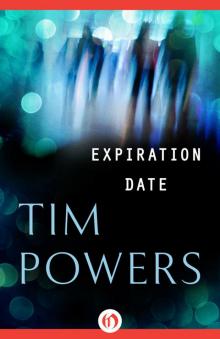 Expiration Date
Expiration Date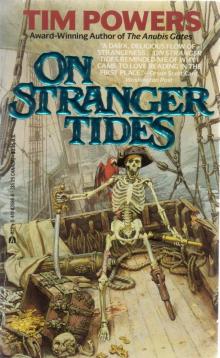 On Stranger Tides
On Stranger Tides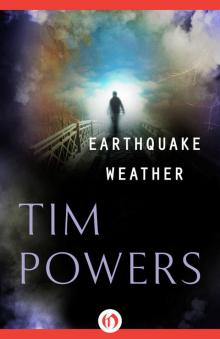 Earthquake Weather
Earthquake Weather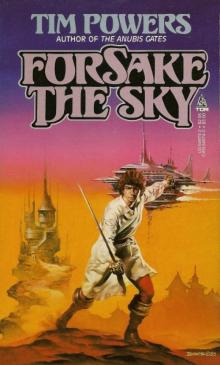 Forsake the Sky
Forsake the Sky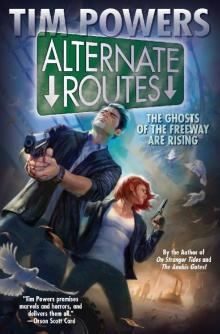 Alternate Routes
Alternate Routes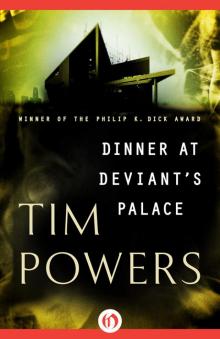 Dinner at Deviant's Palace
Dinner at Deviant's Palace The Stress of Her Regard
The Stress of Her Regard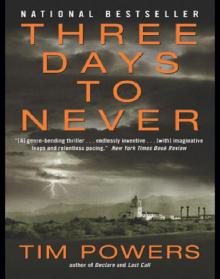 Three Days to Never: A Novel
Three Days to Never: A Novel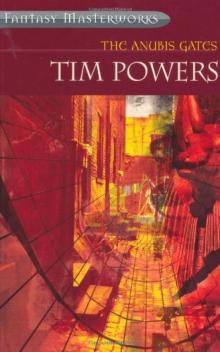 The Anubis Gates
The Anubis Gates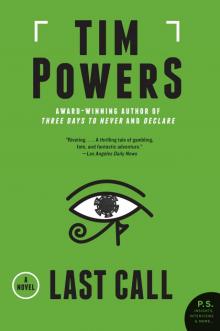 Last Call
Last Call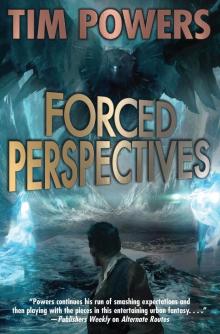 Forced Perspectives
Forced Perspectives Strange Itineraries
Strange Itineraries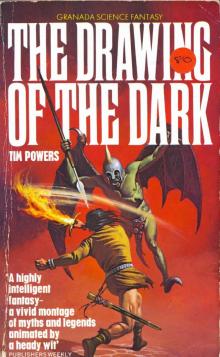 The Drawing of the Dark
The Drawing of the Dark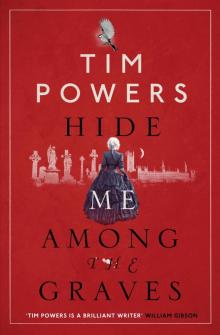 Hide Me Among the Graves
Hide Me Among the Graves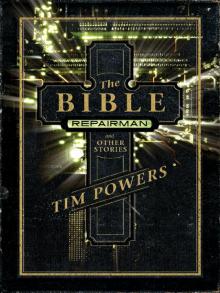 The Bible Repairman and Other Stories
The Bible Repairman and Other Stories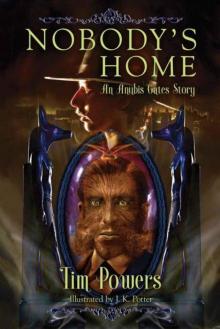 Nobody's Home: An Anubis Gates Story
Nobody's Home: An Anubis Gates Story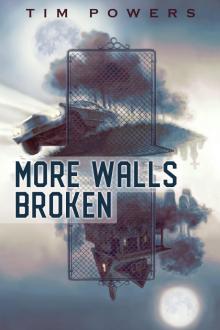 More Walls Broken
More Walls Broken The Skies Discrowned
The Skies Discrowned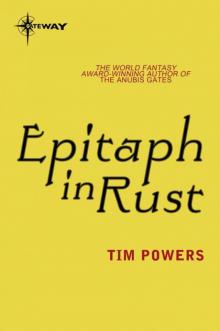 Epitaph in Rust
Epitaph in Rust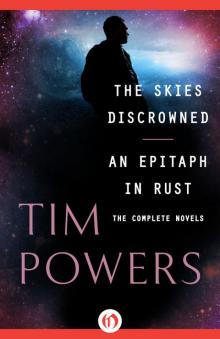 Skies Discrowned and An Epitaph in Rust
Skies Discrowned and An Epitaph in Rust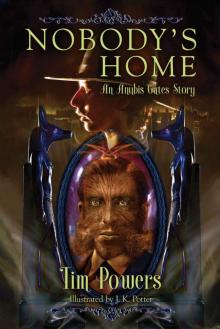 Nobody's Home
Nobody's Home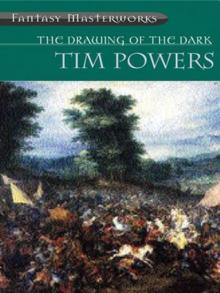 Drawing of the Dark
Drawing of the Dark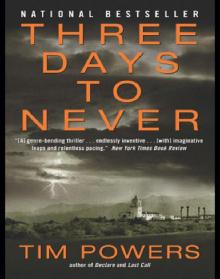 Three Days to Never
Three Days to Never